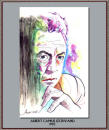|
Albert Camus a Controversial writer - By Professor Dr. Saadat Saeed |
||
 |
|
|
There are two reasons for coritradictory attitudes in writers and intellectuals. Firstly, they are non-serious in formation of their opinions, even against their nature. Secondly, they miss sincerity and lucidity of thought. But the query that how Anis Nagi could reconcile with the writers theoretically poles apart, finds answer nowhere. But apart from other reconcilable or irreconcilable variations in his works one thing is utterly clear that he is a great lover of French existentialist Albert Camus's creative works. A few years ago he translated a philosophical book, "The Myth of Sisyphus" and recently he rendered from French into Urdu, The Plague " La Peste," a wonderful novel by his existential icon. It was a great feat because normally our translators opt for English books. The two-way translation can protect the original text and its flavour.
The Plague is regarded as a great novel of the 20th century which has taken into account the human destiny during Second Great Word War. Fear, lack of hope, denial of future and belief in human beings are a few existential themes by Camus represented in The Plague in different forms. Camus concludes that plague is an unknown affliction which destroys human culture.
"A new classical dictionary of Greek and Roman" says that Abaris, son of Seuthes was a Hyperborien priest of Apollo, and came from the country about the Caucasus to Greece while his own country was visited by plague. In his travels through Greece he carried with him an arrow as the symbol of Apollo, and gave oracles. His history is entirely mythical. He is said to have taken an earthly food and ridden on his arrow through the air. He cured diseases by incantations and delivered the world from plague. Later writers ascribe to him several works; but if such works were really current in ancient times they were not genuine. The time of his appearance in Greece is stated differently: he may perhaps be placed about BC 570.
For ridding people of the plague Camus did not need Abaris. Camus proved that the world could not be delivered from plague with the help of witchcraft.
Hasan Askri was convinced that Camus became popular across the borderlines of France after Second Great War as a freedom fighter, humanitarian dramatist, novelist and philosopher.
Camus friendship with Sartre furnished additional fame to him. In those days he was considered to be celebrated existentialist. After few days when he challenged Sartre's political views, Sartre announced that Camus had no link with his existentialism. He refused even to accept him as a philosopher. Sartre labelled him as an ethics mentor.
After Sartre's campaign against Camus, the followers of fascism praised him a lot. They hailed him as a great philanthropic novelist. But later Camus proved himself to be a great nationalist. Being a citizen of France he opposed Algerian liberation movement. The Algerians were fighting against France.
Camus got Nobel Prize. He died in an "aimless" car accident and as Askari puts it, 'if he were alive, he could have taken many more prizes" because of his pro fascism stand.
We will be waiting for Nagi's comment on these remarks.

